The Video Assistant Referee (VAR) system has been a topic of controversy and discussion in football since its introduction. The use of technology to assist referees in making crucial decisions during a game has been both lauded and criticized. In this critical analysis, we will delve into the VAR decisions made throughout all 51 games at Euro 2024 and assess the impact and effectiveness of the system.
Throughout the tournament, a total of four decisions were overturned with no rejected overturns. Out of the VAR interventions, two led to goals, one to a disallowed goal, and one penalty awarded with no misses. It is essential to highlight the meticulous process followed by VAR officials, such as Referee Clément Turpin and VAR Jérôme Brisard, in ensuring the correct application of the Laws of the Game. One instance where the point of contact of a foul determined the outcome of a penalty decision showcased the attention to detail and swift communication between the on-field referee and the VAR.
The accuracy of VAR decisions came under scrutiny during several incidents at Euro 2024. A prime example was the penalty awarded to Germany after a challenge by Ryan Porteous on Ilkay Gündogan. The subsequent review by the VAR resulted in a penalty being correctly awarded, along with a red card for Porteous. The consistency and adherence to a zero tolerance approach to challenges of a serious nature, as emphasized by referees’ chief Roberto Rosetti, underscored the importance of VAR in enhancing the overall fairness of the game.
Despite the effectiveness of VAR in rectifying clear errors, challenges and limitations persist in its implementation. An instance where a goal by Niclas Füllkrug was ruled out for offside highlighted the introduction of semi-automated offside technology. The need for further refinement and adjustment in incorporating new technology, such as connected ball technology, was evident in cases where decisions took longer due to complexities in player positioning and interference with play.
The evolution of VAR technology is an ongoing process aimed at enhancing the overall accuracy and efficiency of refereeing decisions. The introduction of semi-automated offside technology at Euro 2024 signified a step forward in mitigating human errors and improving the precision of offside calls. However, the need for continued development and refinement in VAR protocols and technology remains paramount to ensure consistent and transparent officiating in football.
The critical analysis of VAR decisions at Euro 2024 sheds light on the intricacies and complexities of implementing technology in football officiating. While VAR has proven to be instrumental in correcting clear errors and enhancing the fairness of the game, challenges and limitations persist in its application. The evolution of VAR technology signifies a positive step towards improving the overall accuracy and efficiency of refereeing decisions. As football continues to embrace technological advancements, the ongoing evaluation and refinement of VAR protocols are critical in ensuring a seamless and transparent officiating process.

Leave a Reply